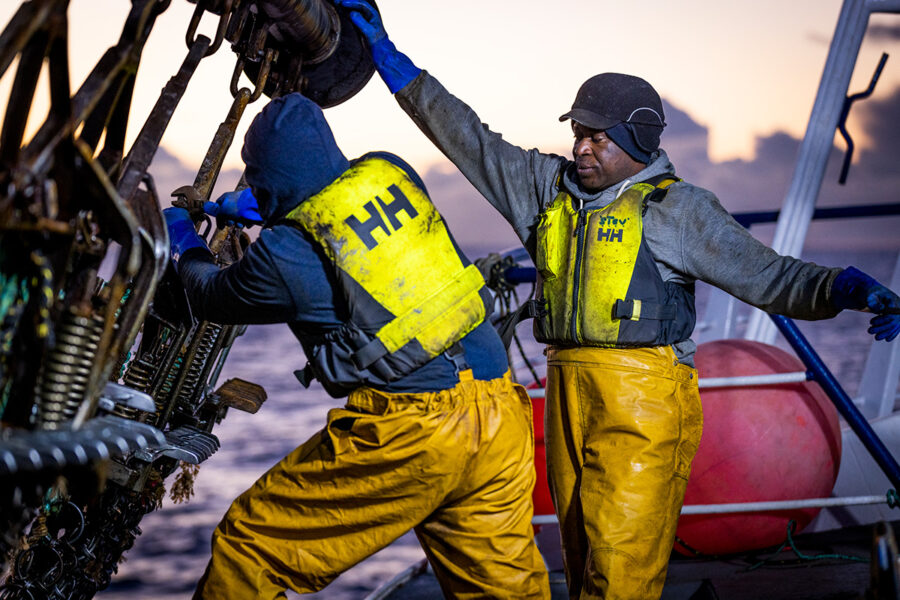With crew welfare back in the spotlight, a new series of films aims to help first-time foreign crew prepare for life and work onboard UK vessels
Eleanor Church of Lark Rise Pictures was commissioned by Waitrose, with support from The Seafarer’s Charity and Stella Maris, to develop a series of short films that would provide information to foreign crew about what to expect when arriving to work on UK fishing vessels for the first time. Waitrose commissioned these films as a response to a report into human rights abuses in the UK fishing sector.
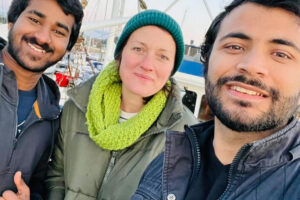
Film-maker Eleanor Church onboard the Welsh scalloper Harmoni MR 7, with two of the foreign crew whose experiences were recorded during the making of the information films. (Photos: Eleanor Church/Lark Rise Pictures)
“I’m just dubbing one of the films into the Filipino languages Tagalog and Cebuano for a release at an event in Manila next week – but it’s a perfect time for a break,” Eleanor said when FN rang to learn more about her work.
“In all, the films are being dubbed in nine languages, to cover a good cross-section of nationalities that Waitrose is aware may be employed on British vessels.
“I suggested early on that I’d like to film in the different parts of the UK, on four different types of fishery, and with at least four different nationalities! It was tough logistically, but I wanted to touch all bases. So I filmed in England, Scotland, Wales and Northern Ireland, onboard a crabber, a whitefish vessel, a scalloper and a prawn trawler, respectively.
“Waitrose specified in the brief that we should show what fishing in the UK looks like in winter – not just sunny, romantic shots. We felt it was really important to fully understand the work being undertaken, and the physical challenges the crew face, so I undertook multi-day trips to see everything at first hand, sleeping onboard, getting up and filming day and night with the fishers, and then concluding the filming ashore at the end of the trips, when things were calmer.
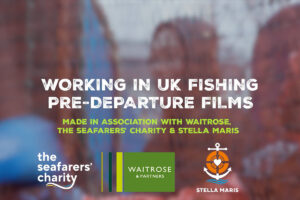
The four short films will be made available in 11 languages, on social media and on online portals, and have been supported by Waitrose, Stella Maris and The Seafarers’ Charity.
“Crew ranged from new arrivals who hardly spoke English through to crew who have passed the English test and are employed as skilled workers.
“I’d never been scalloping before, and starting the work on the Welsh auto-scalloper Harmoni was a real learning experience. The foreign crew onboard included Ghanaian, Sri Lankan and Indian fishermen – something of a difference from many boats I am aware of, where there seem to be groups of the same nationality, often from the same region.
“Filming on the Harmoni showed what a good work and living environment you can create for your crew – but also just how hard the English language test can be. The crew had been provided with tremendous support with their English lessons, and one Sri Lankan crew member had passed the exams from having had very limited English skills 12 months earlier.
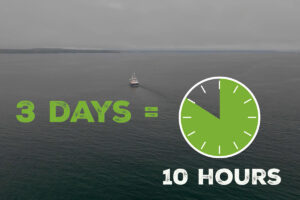
The films contain detailed information for crew about the many aspects that should be included in their contracts, including provision of PPE, minimum rest periods when at sea on multi-day trips, and what shore work can be expected as part of the job.
“But we also interviewed a hugely experienced crewman from Ghana, who has been fishing in the UK for 15 years. He is very much a senior member of the crew, knows fishing inside out and was highly articulate, but he still hasn’t passed the written exam.”
The four films are designed to show crew every aspect of starting life onboard a British vessel, including tips on what to expect with the weather, how to obtain a UK SIM, and travelling to the vessel from the airport.
Other issues covered include what to expect in an employment contract, and how this should be honoured, details of the actual work required onboard vessels, and where to get help, including a list of supportive NGOs and the different authorities in the UK.
“I’ve filmed at sea a lot – off the coast of West Africa and in Asia, and across the North Pacific, for documentaries about trafficking, IUU fishing and similar,” Eleanor said. “But in the depths of winter, thanks to the swell when fishing from Peterhead, landing in Shetland three days later, I had the worst seasickness I’ve ever experienced!
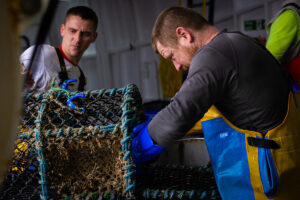
Work underway on the Brixham crabber Winter of Ladram E 24, which is crewed by a team from Latvia.
“That was a surprise, but at the same time, I had a great experience with the mixed crew onboard – mainly Filipino but also Latvian, Irish and Scottish.
“My trip on the West Country crabber Winter of Ladram was a very different experience. The crew were all from Latvia, and unlike other crew were working as share fishermen – an option not available to many of the crew I interviewed.
“As with everyone else I spoke to, their principal reason for working on UK vessels was the higher salaries available compared to working in their home environments.
“The biggest challenge I faced was arranging the filming – fishing is an unpredictable practice, with weather a big factor. For a number of weeks, I was at the ready to head out as soon as I got the green light from a skipper.
“Throughout, I had support from across the industry, to access the vessels and ports, and ask the many questions I had ahead of any actual filming. This feels like something that many in the industry want to get right.
“After all, as the films say, we rely on our foreign crew, so it’s a duty to ensure that they have a positive experience in the UK.
“I’d like to offer a huge thank you to everyone across the ports and boats I travelled to and worked on, for the help and welcome received. After filming investigative documentaries abroad on issues such as migrant work in Asia, or on vessels in Africa, it felt good to be making films that can be used as tools to give people the information they may need to know about what’s right and what isn’t, and where to find help if they need it.
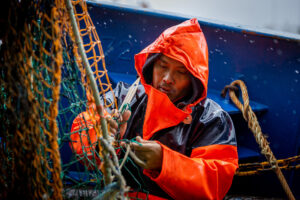
Net repair on the Kilkeel-based prawn boat Fairhavens N 386.
“The documentary maker in me loves telling personal stories, and there were many from the people I got to know over long shifts at sea. Although I was ultimately there to make films that deliver messages to new crew, I tried to tie in a personal touch amidst the information to make it feel like the fishers in the film were familiar and closer to the viewer.
“These are not films that depict bad practice, and I would never want to claim that they are in any way representative of working conditions in all parts of the sector. The fishing industry understandably introduced me to some of its leading vessels, and I wasn’t there to have detailed in-depth conversations with crew about their experiences. This is something best done by the organisations we highlight in the films such as ITF, Stella Maris and the Fishermen’s Mission, and the workers’ own networks that they trust.
“The crew I met did, however, talk about some negative experiences of crewmen on other boats, and they clearly felt it is critically important that crew have information about their legal rights and where to get help when they need it.
“They also talked about the value of having the right agent, which is one of the issues the films flag up – some workers are forced to pay upfront costs or incur debts when being recruited to start on a UK vessel.
“An agent is meant to help fishers navigate contracts, pay and any other expectations from their jobs, but in some instances they are involved in exploiting workers. Crew and vessel operators choosing the right agents is one of the key things that can improve conditions in the sector, as well as actions to improve the wider working and living standards, which is for the fishing industry to lead on.”
The films will be launched on 5 July at the Seafood Ethics Common Language Group event, and will be available on YouTube and through the film’s collaborators.
‘A mission to improve worker welfare’
The Waitrose team explain the motivation ehind commissioning the films Waitrose is a much-loved food brand, known for its high-quality food and particularly for its high animal welfare standards.
We have a long history of caring about fairness within our supply chains, and this is mirrored in our refreshed purpose statement – ‘working in Partnership for a happier world’ – which guides how we operate our business and how we interact with our suppliers.
We were the first retailer to launch a responsible sourcing policy specifically for fish, focusing on fish welfare and ensuring fisheries are well managed. Over the last 20 years, we have led the way in responsible sourcing, encouraging the wider industry to follow suit.
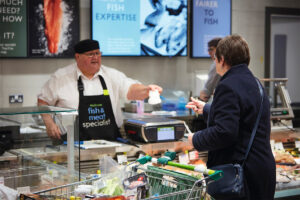
Unlike many supermarket chains, Waitrose has publicly committed to keep its fresh fish counters open. Its support for the making of the films supporting new recruits to the UK fishing industry is, it says, also a sign of its commitment to sourcing more UK-caught seafood for its customers.
Alongside this we have requirements about how people are treated within our supply chains, and have a Responsible Sourcing Code of Practice in place which is applicable to all levels. We know that without people, there will be no supply chains, and without the people who catch the fish, there will be no fish or seafood products on our shelves.
Fishing can be a hard job, and is often described as a lifestyle rather than a profession. It is physical work, and the nature of the seas, especially around the UK, can be unpredictable. Globally, the fishing industry has been linked to poor working practices and human rights violations, so we recognise the sector as a high-risk area for poor working conditions. It is against this backdrop that we’ve made it our mission to help improve worker welfare across the fishing industry and drive best practice.
With our strong commitment to UK sourcing, it remains a priority for us to ensure the long- term sustainability of the UK fishing sector by making it a safe place to work. Therefore, in 2019, we commissioned some research with an independent human rights consultancy to understand how crew, and particularly migrant crew, experienced working in the UK catching sector.
This focus on crew experience mirrors the value we put on hearing from those workers themselves – as an employee-owned business, we place great value on this concept of ‘voice’. The research was conducted entirely through interviews with a strong focus on listening to ‘off-duty’ crew who were at the quayside.
These workers were selected completely at random and there was no connection to individual vessels, or indeed our supply chains, but the random sampling did demonstrate that migrant fishers had often had mixed experiences of working conditions in the UK.
The research indicated that workers are often not prepared for the harsh realities of life at sea and were not aware of their rights. A strong recommendation that came from the report was to work collaboratively with other stakeholders to create this set of films, with content driven by workers and their lived experiences. These will then be shared with people who are seeking work in the UK fishing sector.
Our script really draws from the real-life experiences of people who are working in the sector, giving insight into the things that crew wish they had known when they first came to work in the UK – things such as bringing warm clothes and getting international (not local) phone credit. By working in collaboration with Stella Maris, The Seafarers’ Charity, the International Transport Workers’ Federation and an independent expert – and with input from fishermen’s associations and producer organisations – we believe we have struck a great balance between education about workers’ rights and practical tips.
The films are bite-size to maximise the likelihood of people watching them – maybe more than once – and being able to share them. The final result is something we are all really proud of: the films are engaging and really deliver on the goal of hearing directly from people about their experience.
Our next, and most important, step is getting these films shared. The more people that are aware of their rights, the more they are able to have a positive experience working in the UK fishing sector – which is the ultimate goal.
This story was taken from the latest issue of Fishing News. For more up-to-date and in-depth reports on the UK and Irish commercial fishing sector, subscribe to Fishing News here or buy the latest single issue for just £3.30 here.
Sign up to Fishing News’ FREE e-newsletter here.

